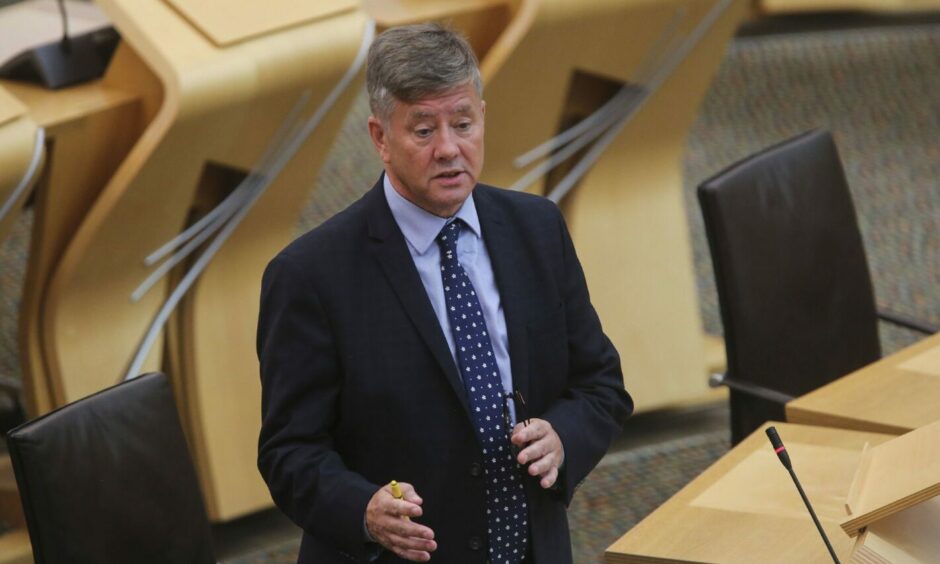The Scottish Government has been forced into a U-turn on trans prisoners and has blocked the transfer of inmate Tiffany Scott to a female prison.
Scott, who is originally from Kinglassie in Fife, was convicted of stalking a 13-year-old girl from prison while living as a man known as Andrew Burns, and went on to assault prison staff.
They were due to be transferred from Low Moss Prison near Glasgow, where they are being held in segregation, to a female-only prison later this year.
However Justice Secretary Keith Brown has now announced no transgender person with a history of violence will be moved from a male to a female prison.
A spokesman for the Scottish Government confirmed this will include Scott, who will now be barred from entering a women’s prison.
‘Unmanageable risk to public safety’
Scott is serving an indefinite sentence and is subject to an order for lifelong restriction, meaning they will only be released when they are no longer considered an “unmanageable risk to public safety”.
They have previously had multiple attempts to be transferred to a women’s prison rejected, but it was reported earlier this weekend that the move has been rubber-stamped.
As well as stalking a young female teenager from prison, Falkirk Sheriff Court was locked down in 2017 amid safety fears as Scott was sentenced for a series of violent incidents at HMP Glenochil in Clackmannanshire.
This included striking a female prison nurse on the back with a chair, punching a prison officer in the face, and spitting and trying to bite a male prison officer.
They also smeared excrement over their cell, tore a drip needle out of their arm and ripped up “tear-proof” clothing.
Last week trans prisoner Isla Bryson was removed from HMP Cornton Vale women’s prison in Stirling after an intervention from the first minister.
Bryson was charged with two counts of rape while living as a man known as Adam Graham.
They have now been moved to a male wing at HMP Edinburgh.
Justice Secretary steps in
The justice secretary has now announced the Scottish Prison Service is carrying out a review on how it manages trans prisoners.
While this review is undertaken, no trans prisoners with a history of violence against women can move into a female prison, and no newly-convicted trans people with this history can be placed into a female prison.
This means Tiffany Scott will not be moved into a women’s prison.
Mr Brown said: “I understand that the issue of any trans woman being convicted of violent and sexual offences is a highly emotive subject and that the public concern is understandable.
“I hope the measures I am highlighting will offer reassurance in the ongoing ability of the prison service to manage trans individuals and ensure the safety of all prisoners.”
He added “predatory men are the risk to women” and said the government cannot allow any suggestion that trans women are an inherent threat to women to take root.
A review into the lessons learned from the case of Isla Bryson will also be carried out.
Mr Brown added: “The ongoing safety of prisoners – many of whom have experienced gender-based violence in the community – will remain the priority in all actions that are taken.
“Beyond the steps being set out today, it is vital that decisions about the location and management of prisoners continue to be based on thorough risk assessment, drawing on the expertise and input of relevant professionals and applying any lessons learns from the reviews referred to.”
Row over gender reform
This row comes after the UK Government blocked the Scottish Government’s plans to overhaul how trans people can legally change their gender.
The proposals would have seen the age someone can apply for a gender recognition certificate lowered from 18 to 16, removing the need for a medical diagnosis of gender dysphoria, and reduced the time they need to live in their acquired gender to three months.
The bill was passed in December 2022 by 86 votes to 39.
However the UK Government has since stepped in and blocked this bill from being made into law.
It has since been revealed SNP MP Dr Lisa Cameron wrote to Scottish Secretary Alister Jack to intervene on Holyrood’s gender reforms.


